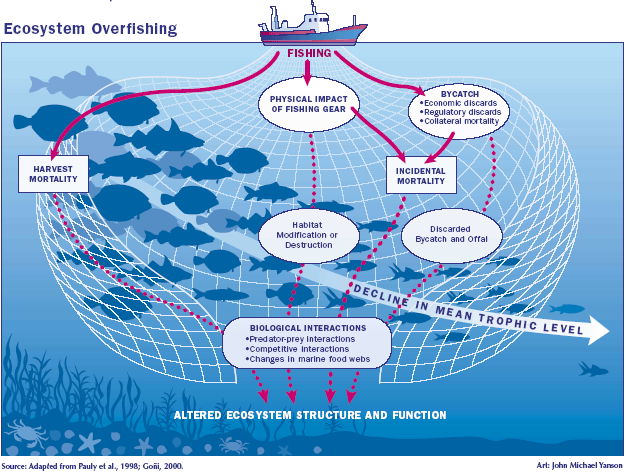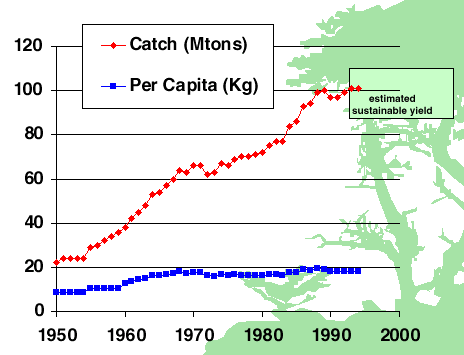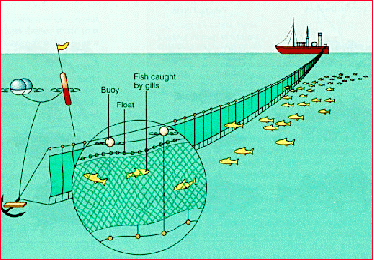

The implementation of sustainable practices to mitigate biodiversity loss would be incomplete without an analysis of harmful practices in the greatest source of biodiversity: the ocean. Pollution, modifications of coastal systems, and overexploitation of fisheries not only harm specific species of marine biodiversity; individual species are linked in intricate and complex webs in a system, meaning that as one species is over-exploited, every species dependent upon it will in turn be affected. Agencies of the United Nations report data that global fish stocks are in grave danger, as overfishing and environmental degradation are systematically depleting sources of marine biodiversity (Nuttall 2004). In the last decade, in the north Atlantic region, commercial fish populations of cod, hake, haddock and flounder have fallen by as much as 95 percent ("World Fisheries" 2006).
 |
Perhaps one of the largest problems for marine resource sustainability is the increasing demand for fish products. The global consumption of fish has doubled since 1973 (Ahmed et al. 2003). Stocks are consistently overfished, threatening to completely collapse populations of fish around the world:
 |
As the graph shows, the amount of total catch has steadily risen since the 1950s and seems to be stabilizing at 100 million metric tons per year. However, the catch per capita has grown very little and is mostly constant. This suggests that if the amount of total catch does not continue to increase, the per capita availability will decrease, driving up prices and leading to a general crippling of the fishing industry. The evidence that the total catch is now stabilizing is a clear indicator of the lack of sustainable fishing techniques that are depleting our oceans faster than nature replaces them ("World Fisheries" 2006).
Over-fishing is a significant problem for ocean resources. Lists of resources that are over-used have been compiled to great lengths. Additionally, data displaying the peak catch year of fish species shows that as we over-exploited one species, we just moved to another species and overfished it ("World Fisheries" 2006).
| Species | Peak Year | Peak Catch | 1992 Catch | Decline(in millions of tons) | Percent Change |
|---|---|---|---|---|---|
| Pacific herring | 1964 | 0.7 | 0.20 | 0.5 | -71% |
| Atlantic herring | 1966 | 4.1 | 1.50 | 2.6 | -63% |
| Atlantic cod | 1968 | 3.9 | 1.20 | 2.7 | -69% |
| South African Pilchard | 1968 | 1.7 | 0.10 | 1.6 | -94% |
| Haddock | 1969 | 1.0 | 0.20 | 0.8 | -80% |
| Peruvian anchovy | 1970 | 13.1 | 5.50 | 7.6 | -58% |
| Polar cod | 1972 | 0.35 | 0.02 | 0.33 | -94% |
| Cape hake | 1972 | 1.1 | 0.20 | 0.9 | -82% |
| Silver hake | 1973 | 0.43 | 0.05 | 0.38 | -88% |
| Greater yellow croaker | 1974 | 0.20 | 0.04 | 0.16 | -80% |
| Atlantic redfish | 1976 | 0.7 | 0.30 | 0.4 | -57% |
| Cape horse mackerel | 1977 | 0.7 | 0.40 | 0.3 | -46% |
| Chub mackerel | 1978 | 3.4 | 0.90 | 2.5 | -74% |
| Blue whiting | 1980 | 1.1 | 0.50 | 1.8 | -26% |
| South American Pilchard | 1985 | 6.5 | 3.10 | 3.4 | -52% |
| Alaska pollock | 1986 | 6.8 | 0.50 | 1.8 | -26% |
| North Pacific hake | 1987 | 0.30 | 0.06 | 0.24 | -80% |
| Japanese pilchard | 1988 | 5.4 | 2.5 | 2.9 | -54% |
| TOTALS | --- | 51.48 | 21.77 | 29.71 | -58% |
Over-capacity refers to the current state of affairs in that the capacity of the fishing industry to function is much higher than the availability of fish. Despite data in the 1970s and 1980s that marine catch numbers were slowly decreasing, the fishing industry grew. Moreover, the increase in technology efficiency means that the industry today is double the capacity it needs to be to catch the same amount of fish it is currently harvesting ("World Fisheries" 2006).
One such example of a new, efficient fishing method is the use of drift nets (see below), which are about 50 feet by up to 65 kilometers in size. Nets from the Japanese, Korean, and Taiwanese combined span about 48,000 kilometers which is enough to encircle the globe. They are almost 100 percent efficient in killing anything they encounter. Although each fishing country bans them within their own borders, "flag hopping," or the casting of drift nets into international waters plays a very significant role in depleting fisheries ("World Fisheries" 2006).
 |
Additionally, the fact that humans are now fishing for species in lower ecological trophic levels (that were once considered "bait") is evidence that we are overharvesting our marine ecosystems because we have completely overfished at the higher trophic levels. The paradox of this situation, however, is that "fishing down" or fishing at lower trophic levels actually reduces yield, since competitor species simply fill the void left from fishing successively lower species in the food chain.
Climate change will also play a major role on marine ecosystems that must be considered in implementing this system.